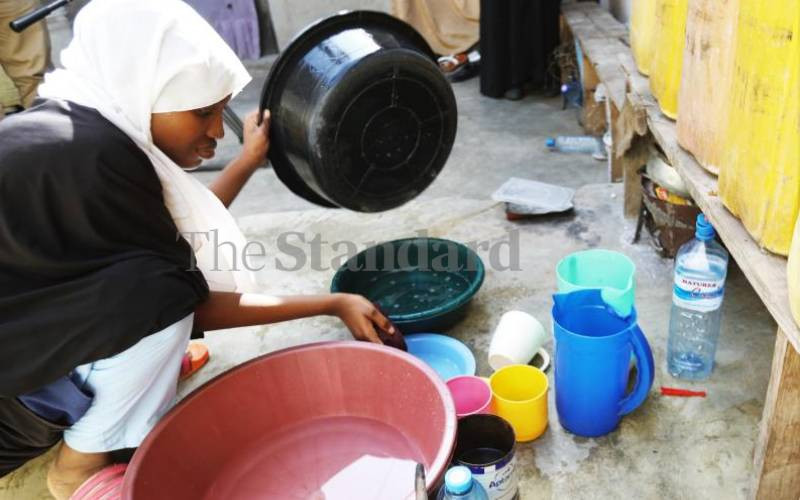
Of proper nutrition, health or education often get stuck in a cycle of poverty without a fair chance in life. It is even worse for children living with different disabilities; physical or visual impairment.
But at Likoni School, for instance, disabilities hardly hinder children from performing key functions. In fact, some walk in pairs to help each out.
Binny Ramadhan, 17, the first-born in her family, is a KCPE candidate this year despite being visually impaired, delaying her enrolment in school. She transferred to Likoni Primary from a different school. There she had trouble seeing whatever the teacher wrote on the blackboard. "I had trouble seeing. I had to wait then copy from other students," she says.
Binny says that even exam papers were hard to comprehend, as she could not see what was written in them. "When I joined this school I was introduced to braille and the environment is friendlier. If I am unable to comprehend, I ask teachers who respond," narrates Binny, whose family lives about 10km from the Mombasa CBD.
Her dad, Ramadhan Athman, lost his job at the Export Processing Zone at the height of the Covid-19 pandemic. He now spends his time at home when not searching for casual jobs.
Athman says he was forced to take Binny to a private school as there were no public schools in the area.
"Binny would often complain that she had been called names and referred to as blind. At one point, I could not contain myself when an elderly man called her blind," says Athman, recalling how her troubles began three months after birth. Something was clouding Binny's cornea.
Medics at Port Reitz hospital recommended an operation. Binny had cataracts.
"We went to another hospital in Makadara and were told the operation would happen at six months. What worried us was that Binny suffered sudden attacks before falling asleep. We never understand why," says Athman.

A year later, matters did not improve. And when a mass eye checkup came to the hood, they took Binny. Medics said she had undergone an operation improperly. The parents declined another operation, fearing Binny would lose her other sight. Binny had to wait for her younger sister to be of age so as to accompany each other to school.
"In Class Seven, she didn't register for national exams, as the Education officer said Binny required a special school and it would not be fair to grade her as other students," explains Athman. "I was advised to get her assessed from a public health facility." It was not until UNICEF and other stakeholders began conducting an assessment of children living with disability in Mombasa County that Binny was assessed and found a spot at Likoni School for the visually impaired.
Jane Musuva has been a Senior Teacher at the school for 13 years, helping the over 170 learners suffering low vision and the totally blind. Taking care of such vulnerable children needs funding.
"There is capitation from government, Sh2,000 per child per year, but it is not enough," she says. "We have well-wishers and that is how we survive."
According to UNICEF, about 13 million children in Kenya need assistance but only 7.5 per cent are receiving it. Their parents are among the poorest in Kenya where expanding social protection would provide a lifeline for families. "UNICEF does not implement programs directly. We support the government to implement programs to ensure every child gets the social support they require. So far we have supported revision of social protection policy, the Children's Act and strengthening systems of service delivery," explains Susan Momanyi, a Social Protection Specialist, UNICEF Kenya
According to the 2019 census, 2.2 per cent (0.9 million people) of Kenyans live with some form of disability.
In Mombasa alone, the numbers are hard to determine as some parents hide their children.
"Without an assessment, you are not able to be properly placed in a school, and worse if you don't have a disability card there are some services you cannot access," says Momanyi, adding that UNICEF has supported Mombasa County to implement a program whose three pillars see children assessed and provided with disability cards thus improving social protection of children.
Jane Wandia Githui, Director of Budget and Economic Planning in Mombasa County, says a social protection strategy was developed to facilitate social protection of children.
But during times of transition of governments children living with disabilities are often forgotten receding any gains made in inclusivity and protection of vulnerable children.
"The incoming government should increase the support accorded to special needs schools as buying resources is more expensive compared to buying an exercise book costing sh100," says Musuva.
Children like Binny have had their lives changed through social protection. She will be sitting this year's final primary national exams of which she is prepared as part of her aspiration to be a nurse or a journalist.
 The Standard Group Plc is a multi-media organization with investments in media platforms spanning newspaper print
operations, television, radio broadcasting, digital and online services. The Standard Group is recognized as a
leading multi-media house in Kenya with a key influence in matters of national and international interest.
The Standard Group Plc is a multi-media organization with investments in media platforms spanning newspaper print
operations, television, radio broadcasting, digital and online services. The Standard Group is recognized as a
leading multi-media house in Kenya with a key influence in matters of national and international interest.


